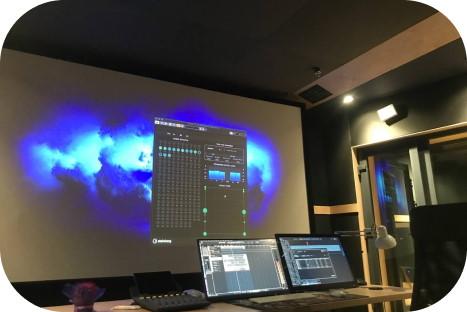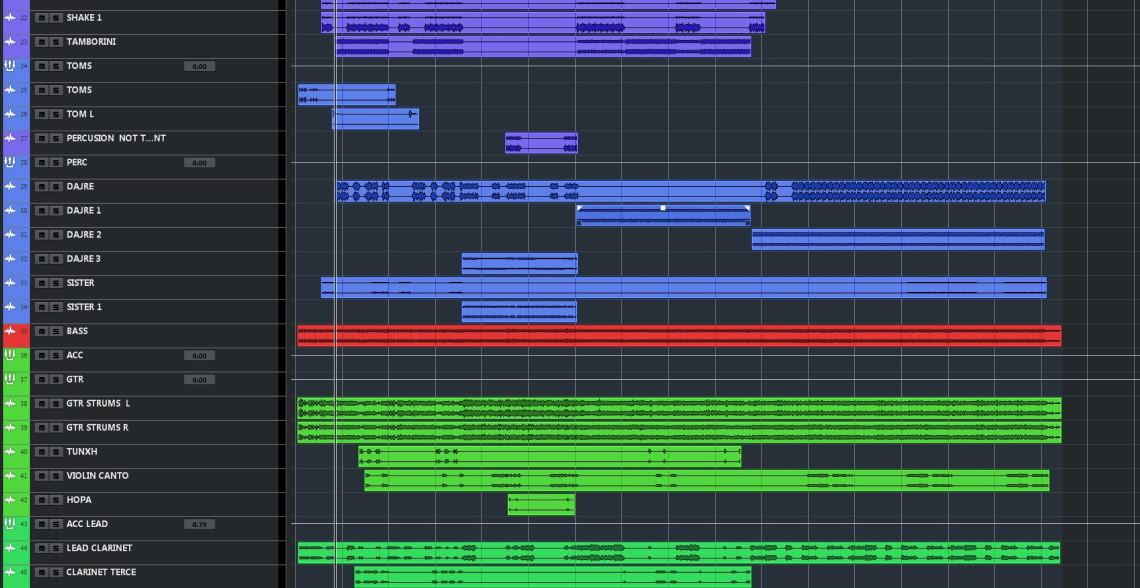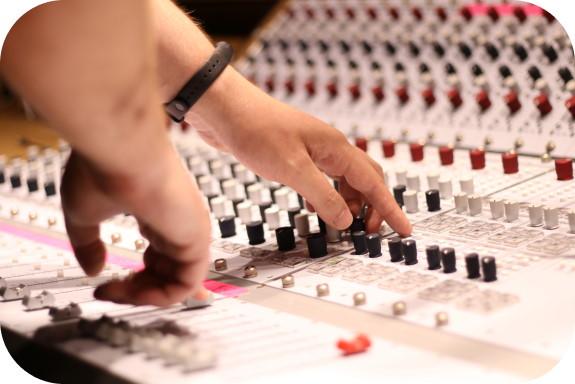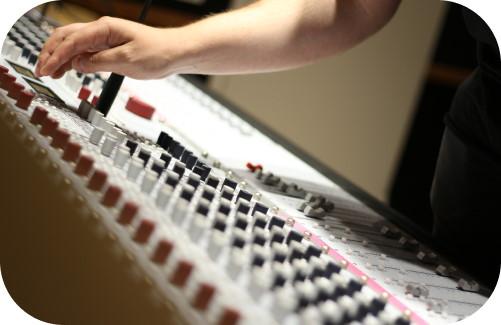In this article, we’ll describe the main differences between mixing and mastering and why they are important. Let’s take a look.
For more than ten years we have been mixing and mastering songs of different complexity and genres, we know mixing and mastering from the inside out, and we’ll share our experience with you right from our hi-tech studio.

Mixing means combining many tracks into one coherent song. The mixing process consists of editing and processing the tracks, as well as adding various effects. It also includes placing the sources of the sounds virtually in the stereo image, or in a 3D sound stage if we are mixing for 3D sound technologies like Dolby Atmos.
Before talking about mixing, let’s recall the process of song creation for a moment. Let’s say you created the idea for a song, wrote musical and vocal parts, and recorded them. That’s a lot of work already. Now you have a set of recordings, called a multitrack. The picture shows what multitrack looks like in a DAW (digital audio workstation).

Exactly with such multitracks musicians come to us, and in our mixing and mastering studio, we perform mixing, mastering, and other needed edits like vocal pitch correction, instrument replacement, and others.
Initially, the multitrack is just a bunch of sounds that are playing together. They are all perceived as coming from one place in the virtual space forming a mono, they mask each other, are out of balance, there’s no lead part, no back, nothing is in the front or in the back, and so on. Our mixing engineer takes this multitrack and works with it to create a coherent, complex song, which can compete in the music industry.
Here are just some of the tasks that a mixing engineer will work on:

The job of a mixing engineer is to blend the sounds in such a way that every voice and instrument could be easily heard, the sound would be perceived as being set in a 3D space, where every instrument has its place.
How to make the song an interesting, captivating, rich stereo picture to listen to, so the audience would choose it again and again?
To create this takes talent, deep skills, and years of experience, which not everybody has. That’s why many musicians say that it’s difficult to find a real professional audio engineer to mix and master their songs.
We can proudly say that the artists who work with us and use our Major Mixing mixing and mastering for their songs are happy they found the right studio. We have the needed understanding of music, big-project experience, and skills to bring your song to the high industry level.
You would need years to learn mixing thoroughly yourself, but your perfect song is just one click away.
Message us now, and we’ll be happy to assist you on the road to success, create a competitive, industry-level mix for your song, and answer any questions!
Get StartedHere are some basic tools we and other audio engineers use. But only the right combination, settings, and the choice of application of these and other tools make the professional mixing engineer’s magic work.
The main purpose of mixing
When with the help of mixing you transition from a stack of tracks to a coherent song record, do you receive just another song that’s similar to hundreds of others, or is it a unique, captivating, easily recognizable future hit? Above all the technical tricks, the main purpose of mixing is to express the emotions and feelings of the song correctly, depict the song’s individuality, make it interesting and captivating to listen to.
To create a future hit, a mixing engineer, besides knowing the equipment and software tools, must have high artistic skills and experience:

To create a great mix, you need to listen to it and be able to determine exactly how good or bad the instruments sound, one by one and together.

There are elements and features that need to be emphasized and mixed differently in every particular genre. You must know them well and mix accordingly. For example, we professionally bring up 808 bass when we mix hip-hop. But a rich and hard bass together with a unique recognizable vocal are just some features our mixing engineer pays attention to while mixing a rock song.

It takes not only mixing according to the similarities of the genre but also paying attention to what’s different in this particular song. You need to discover a future hit in the song you are mixing and find in it the features and feelings that can make it popular. Making everything in the mix serve this unique beauty of a particular song takes the skills and talent of a professional mixing engineer.
The real purpose of mixing is to create a song that will impress the audience, the song people will love and want to listen to again and again. This is our main goal at Major Mixing, we treat each song as a future hit and mix it that way.
Preparing your mix for mastering, make sure that:

If you come to us for mixing and mastering you will not have to do this, because we’ll do online mixing and mastering for you and return to you the ideal song prepared for distribution.
See Also – Can artists learn to do their own music mixing?
Mastering is the standardization of a recording to make it perfectly fit and compatible in the contemporary music industry and for streaming platforms. It prepares a song for release, setting the loudness and equalization in compliance with the existing standards. An in-depth mastering also improves the song, correcting the shortcomings and mixing mistakes if possible.
Our mastering engineer checks the mix if it fits all the industry’s standards.
There is a standard frequency curve and loudness range for the releases today:
As mastering is sometimes aimed at a particular streaming service, the specific platform’s requirements will be taken into account while mastering. For example, when mastering for iTunes, it’s professional to present your song fit for the Apple Digital Masters badge. This involves following special mastering high-quality requirements and should be done by a certified ADM provider mastering house. Major Mixing is completely certified to create Apple Digital Master for your song, read more on this topic here.
The most used plug-ins for mastering are compressor and equalizer. Usually, a limiter is involved to cut the out-of-range peaks. Rarely used tools are stereo imager and saturation.
Also, while mastering, our audio engineers will add some effects to the master bus for correcting some mixing shortcomings if needed. For example, if the track is not bright enough, the mastering engineer can EQ the high-end up a little to brighten up the song. So the track would sound as good or even better compared to other tracks on the playlist or on a streaming platform.
During the past decades, and sometimes even now, mastering engineers would add meta-tags to the record, which included the song name, singer, composer, ISRC codes, and more. Other tasks for mastering engineers, which are almost a history now, would be to cut a vinyl record master.
Mastering can make a mix better or worse depending on the qualities of the mix. This happens because the compressor tool that is almost always used for mastering will amplify quiet sounds bringing underlying mixing mistakes to the surface. Mastering will most probably make a good mix better and a bad mix worse.
So, the right approach is to never wait until mastering to make your song great. Perform your recordings with the highest quality possible, do your mixing professionally, and then mastering will add the needed final touch.
The best way is to find a professional mixing and mastering engineer to create an industry-level master record for you, which will look great compared to top-chart songs in a playlist, or even stand out among them.
Yes, you can, and professional mixing engineers perform early mastering to get the idea of what the final track will look like. It has nothing to do with the final mastering, it’s just a necessary trial to understand how good your mix is. Performing trial mastering while mixing is a necessary step to make sure the song is ready for mastering.
Real mastering will be done as a separate process later, and maybe by a different person, a mastering engineer. But even if the same specialist will perform mixing and mastering for a song, still, at first mixing must be completed and all trial mastering changes should be removed from the master bus.
It often happens that when a mastering engineer applies compression, the dynamic picture, which was created by a mixing engineer, disappears. That’s why a mixing engineer usually applies mastering to check. This way, he or she will be able to see if the dynamics of the song will remain as they planned after mastering and adjust the mix accordingly. If a mixing engineer has done the checking and has already created the mix in such a way that the master bus compression will only bring the mix to the intended shape, all the mixing ideas will be preserved in the final master record.
While mixing, we at Major Mixing always perform trial mastering and make sure that after master bus compression your song will stay perfect as planned with colorful kicks and snares, and good dynamics. You can give us the song only for mixing and be sure that you’ll receive the mastering-friendly mix which after the final compression will still be impressive, colorful, and retain the intended dynamics.
Mixing and mastering are two separate processes, each of which requires studying theory and learning practical skills, including working with DAWs, hardware, and training your musical ear. Besides that, the audio engineer learns many useful tips and tricks of music editing by experience. It’s a complicated set of skills that take hard work to master.
Without lots of knowledge and practice, it’s impossible to mix a multitrack into a high-quality song and to master a song into a professional record.
Yes, mixing and mastering is hard, but only when you are trying to do it yourself as an amateur, or worse, ask a non-professional to do it for you. The artists that come to us with their songs know that if you partner with professionals, releasing great songs is actually quite a simple task. We have vast experience working with artists and big labels, and we can bring your song to the industry level right now.

We have vast experience in this area, and watch the music industry, implementing all the newest rules and trends in our work. Each Major Mixing team member has years of experience mixing and mastering high-level industry projects. Write to our live chat to contact us, we’ll be happy to help!